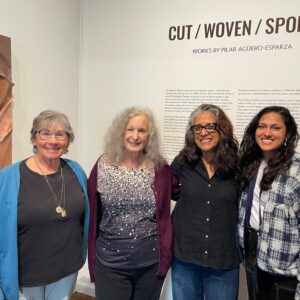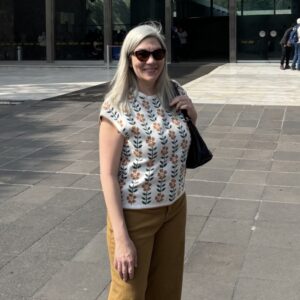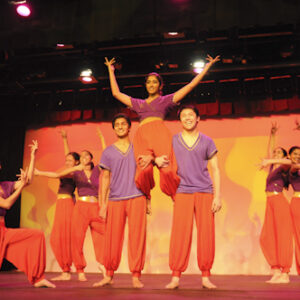Student-Directed Showcase (SDS) is the culmination of four years of hard work tempered by both fun and the passion performers bring to their craft. Each year eager seniors apply to take this course, taught by Laura Lang-Ree, and the lucky few get an unusual glimpse into the world of play direction and production.
Each director must choose the piece to be presented, plan the set, choose the cast, and arrange for all the necessary technical help to make the production a success. This year four seniors, Aditya (Adi) Parige, Mallika Dhaliwal, Allika Walvekar and John Ammatuna, took up their tasks with a will and produced some great theater.
The shows were sold out based on the high standard of production SDS has shown in the past, and the four directors did not disappoint. The shows this year were “Hard Candy” (Walvekar), “The Marvelous Wonderettes” (Ammatuna), “The Dancers” (Dhaliwal), and “All In The Timing” (Parige).
The scope of the work alone was a challenge. “I found it to be rather daunting at first because I realized my duty and the level of intensity needed in my new, demanding role,” said Ammatuna.
“I never realized how many views there are when looking at a show,” he added. “I had to look at it as a director, musical director, costumer, props manager, choreographer, technician and audience member, but learning to look at the show in so many ways was a great experience because I gained an understanding of how each job in theater functions, how they interact with one another and the amount of work each takes.”
Each candidate learned that managing people is critical. Parige noted that working with close friends and peers “was probably the most difficult aspect of directing. However, my entire cast was very cooperative with keeping the director-actor relationship completely professional, so conflicts were minimal.”
Dhaliwal agreed working with peers was a challenge, but the upside is the bonding that occurs. “I think casting was really hard, mainly because it’s so difficult to say no to anyone,” she said. “Getting costumes and props together was difficult, but extremely fun. We were very lucky to have a great group this year … gaining a closeness within the cast is very important,” she said.
For Ammatuna, the bond embraced those from all four productions. “Even though the shows were four separate shows, we were all like one big family,” he said.
Naturally, each learned something from the effort. “Patience,” said Parige. “It’s important to stay calm and relaxed and work with someone.”
Dhaliwal noted, “Organization, flexibility, calm and reinvention were all necessary during the production to make it run efficiently.”
Walvekar agreed. “I definitely realized that you have to stay true to your directorial vision, but you also have to be flexible,” she said. “Not everything can happen the way you first envisioned it, so you have to be willing to adapt.”
And there were challenges. “I think dealing with conflicts when trying to schedule rehearsals was definitely the toughest part of the job,” Walvekar said. “Organization was an important part in pulling the production together – I had a cast of 11, and it was tough to find times when we all could meet.”
Like any first pass at a job, the learning process was part of the work. “I would probably start gathering costumes and props a little earlier so they could be integrated into the process early,” said Dhaliwal of her effort.
Walvekar agreed and added, “I would have had a few more group rehearsals, and it would have been nice to have some more group activities.”
Parige looked at the broader picture. “In my next directing venture, I will probably focus a lot more on perfection. While I feel like my show was an amazing final product, you can never stop perfecting anything. But I do not regret any part of it. I would keep the experience exactly the same. It was an amazing learning experience for a future director.
Ammatuna was also happy with how his production went. “I made sure going into the process that I had dreamed up every idea possible to make this show as creative as possible. I was very detailed with every character and dance move. The more detailed a show is, the more professional. I believe I did my best to put on as professional and creative a show as possible.”
His perspective was tempered by his experience. “Student Directed Showcase is a very rare opportunity full of responsibility and fun,” said Ammatuna. “You have to make sure that you are not only into this with your heart but with your head. You have to be the brains, heart and dreams of the show and an extremely strong leader. This is not for the faint-hearted. But, if you are one to want to make the visions in your head come alive, then by all means go for directing. Just make sure you are 110 percent committed before you join.
“Another grueling part of bringing your vision to life was being in charge of making so many decisions,” Ammatuna added. “There are so many decisions to make as a director that you need to be able to say yes and no without regret. You need to learn to follow your heart and vision but not lose sight of what is best for your actors.”
All four students will stay in performing arts when they go off to college next fall. “I have applied to many schools for either a B.F.A. in musical theater or B.A. in theater,” said Ammatuna. “I want to hone my skills as a singer, dancer, actor, choreographer and director. I have gotten into The American Musical and Dramatic Academy with a scholarship for a B.F.A. in musical theater and Notre Dame de Namur University with a scholarship for a B.A. in theater.”
Dhaliwal plans to stay involved regardless of her major. “I plan to write plays, direct, costume and act, even if I am not a theater or music major,” she said.
Walvekar is on the band wagon, as well. “I plan on minoring in music and continuing to participate in theater productions in college. I also hope to continue to sing in a choir in college,” she added.
Parige, like Ammatuna, is going hard core. “I plan on being a film major and get into filmmaking 24/7. Directing has been my passion since I was nine years old, and it is very unlikely that it will change at all.”
He noted it will be challenging. “As a director,” said Parige, “it is important to remember that it isn’t all about you. There are so many different branches that come together to put on a great show: actors, directors, producers, technicians, musicians, etc. Collaboration is the key.”
All four students will take away a lifetime experience from the shows they produced. “SDS was the most amazing opportunity and I will treasure it forever because it allowed me to grow both as an artist and as a person,” said Dhaliwal.









